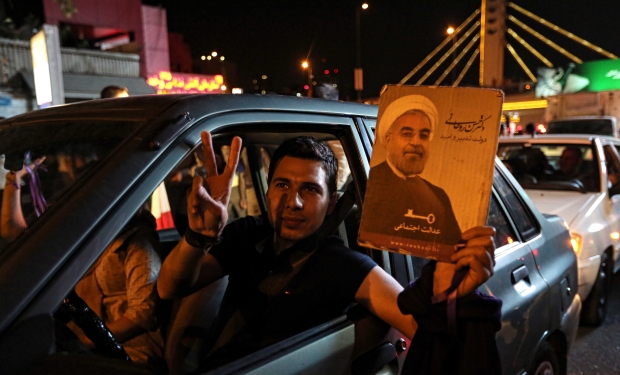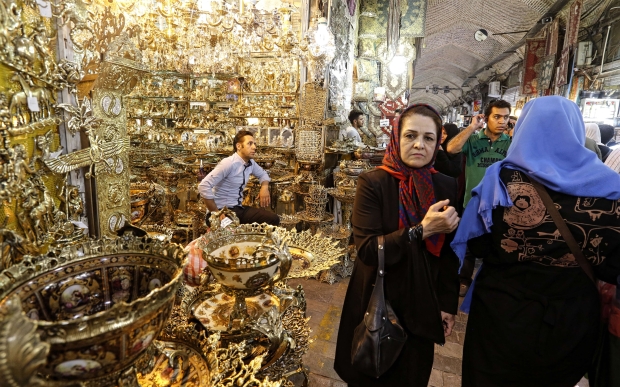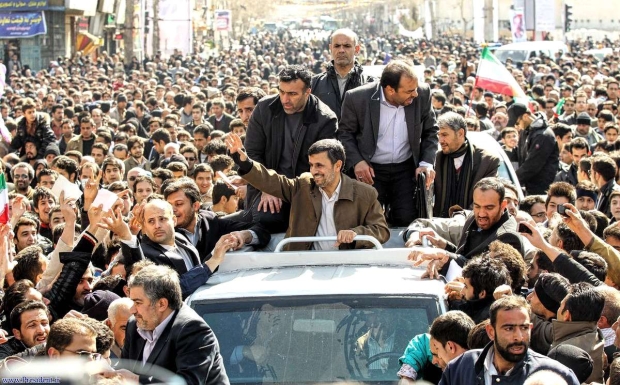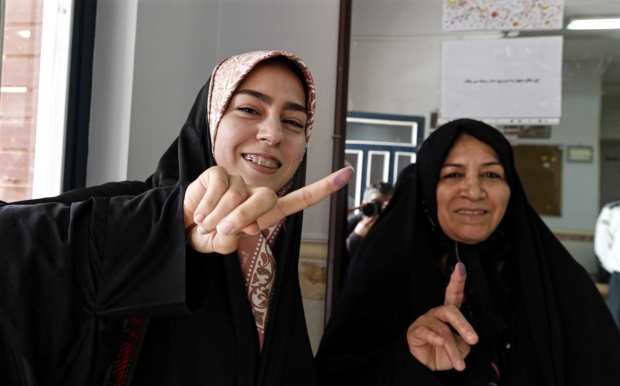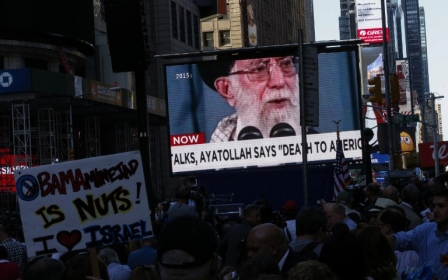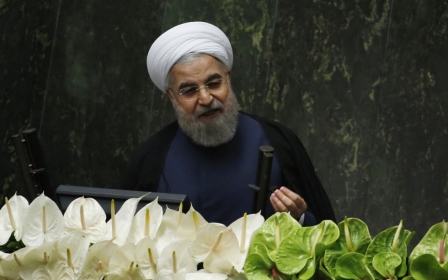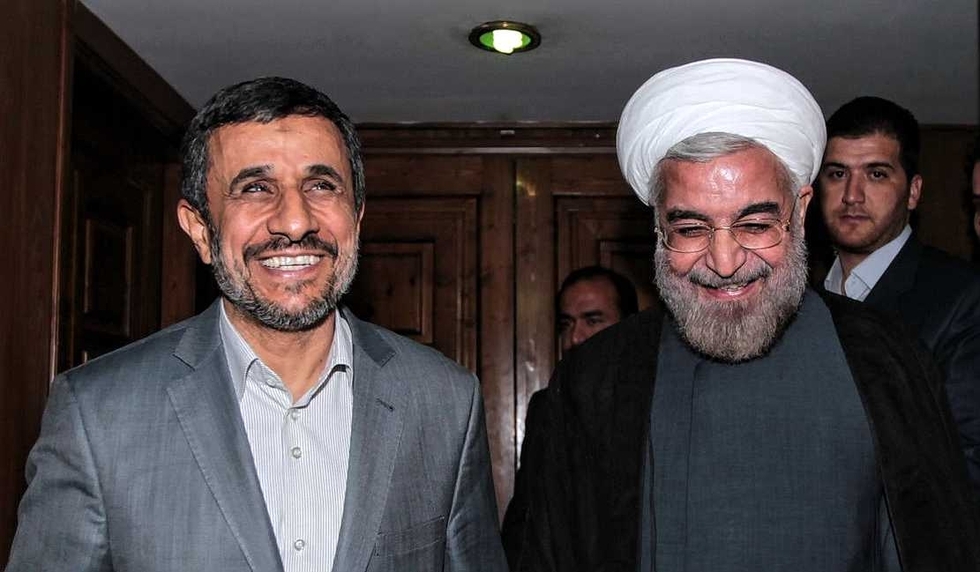
Iran's election: Is it going to be Ahmadinejad versus Rouhani?
There are nine months until the next Iranian presidential election in May 2017, and analysts and supporters of President Hassan Rouhani are beginning to ask whether he will win a second term.
Widespread public frustration at the lack of economic benefits, after sanctions were supposed to be lifted following last year’s nuclear deal, has dented his popularity and boosted the chances of a come-back by conservative and anti-Western former president Mahmoud Ahmadinejad. A scandal over the high pay awarded to top government officials has also not helped the incumbent president.
'Maybe Rouhani is the first president who will serve only one term. All his predecessors had eight years'
- Amir Mohebbian, journalist
“Before the deal was signed, Rouhani said that by solving the nuclear issues we can solve every other problem. He raised expectations too much”, said Amir Mohebbian, director of the Arya News Agency, who describes himself as a pragmatic principlist (“Principlist” is the term normally used in Iran for conservatives.)
“His second mistake was to say the deal was a win-win game. People now say the US won by closing our reactors. They ask what Iran won”, Mohebbian told MEE. “Maybe Rouhani is the first president who will serve only one term. All his predecessors had eight years”.
How the nuclear deal has hindered Rouhani
While most Iranians blame the United States for not fulfilling its side of the nuclear bargain, and for pressing its European allies to go slow on resuming business with Iran, Rouhani and his supporters are trying to divert attention to the non-economic benefits of the deal. They say that it removed the threat of war and reduced international Iranophobia.
Foad Izadi, a professor at Tehran University’s Faculty of World Studies, said: “If the results of the deal stay as they are, Rouhani will have difficulty in being re-elected. In 2013, he had less than 51 per cent of the vote. It was a very slim margin.”
When Rouhani came to power he inherited an inflation rate of more than 40 per cent. Saeed Leylaz, a liberal economist, told MEE that GDP was now positive again and that the industrial sector was working. “We’re continuing to lower the inflation rate, and it’s now less than 8 per cent, the first time since 1990 that it’s not been in double digits,” he said.
But, he conceded, there was still a long way to go towards a recovery. “The purchasing power of workers in the private and public sector dropped 40 per cent between 2010 and 2013. Since then we’ve made up only between 12 and 15 per cent of that drop. GDP went down by 10 per cent between 2011 and 2014.”
The signs say the economy is hurting
To gauge the mood on the street, MEE visited bazaars in south Tehran as well as Amol, a small town near the Caspian Sea. There, we found general complaints among shop-keepers and consumers alike that they had little money for purchasing anything more than food and other necessities.
In Amol, the commercial centre of Mazandaran province on the Caspian coast, Atikeh (she declined to give her last name) works as a saleswoman in a children’s clothing shop. “As you see, we have no customers," she said. “It’ll be a little better after 6pm but people don’t have enough money. I expected it would be better after the nuclear deal was signed. It wasn’t much better in Ahmadinejad’s time, though we did sell more then.”
'I expected it would be better after the nuclear deal was signed. It wasn’t much better in Ahmadinejad’s time, though we did sell more then'
- Amol, shop worker
Lack of demand is also affecting factories producing consumer goods: many are working at little more than half their capacity, according to one owner of a textile plant who did not wish to be named.
One of the country’s continuing crises is the vast pool of unemployed young people, a phenomenon not unique to Iran. Some 60 per cent of the country’s population is under 30, and 11 per cent are out of work, according to Mansour Moazami, deputy minister of industry. Among young graduates and post-graduates the figure rises to 19 per cent.
Powerful voices want to embarrass Rouhani
Liberals admit that while the Iranian economy slumped in the last two years of Ahmadinejad’s eight years in power, his first six years are fondly remembered, particularly in the provinces outside Tehran.
He toured the country and asked local people what they needed, lavishing spending on new infrastructure, from sports facilities and paved roads to clinics and playgrounds in public parks. People saw tangible benefits: many forget the high inflation which his spending eventually provoked. Ahmadinejad blamed the inflation on sanctions.
This spring, Rouhani was embarrassed when the pay-slips of top executives at Central Insurance of Iran, a state-controlled insurance company were leaked. They revealed that they were receiving $28,600 a month, around a hundred times the minimum wage. Under Iranian law, no state executive should earn more than seven times the minimum wage.
What is certain is that the leaks showed there are powerful voices in the media and government who want to embarrass Rouhani.
There are other signs of a campaign against him. “State TV constantly gives a very bad image of the government, always highlighting negative stories”, complained an Iranian journalist who spoke on grounds of anonymity.
State TV does not come under the supervision of the President but of Iran’s Supreme Leader, Ayatollah Ali Khamenei. Iranian domestic politics have long been opaque, and the payslip leaks and state TV’s negative agenda only add to the mystery of who is behind the latest developments and for what purpose.
'State TV constantly gives a very bad image of the government, always highlighting negative stories'
- Journalist, speaking on grounds of anonymity
Meanwhile, Ahmadinejad is apparently thinking of a comeback. He is busy touring the country again and speaking at local meetings, where he attracts big crowds. But because he is not a government official and next year’s election campaign has not begun, he is not shown on TV - although the black-out could indicate that the Supreme Leader is not willing to boost the former president’s chances at this stage.
The only time Ahmadinejad’s face appears is when he attends Friday prayers in Tehran, sitting in the front row beside top clerics and other dignitaries. No-one knows if this political chess-game of controlled exposure means Ahmadinejad is being readied as a potential challenger to Rouhani in next year’s election - or, less dramatically, as an instrument to press Rouhani to be more effective.
What do the polls say?
One man with his finger closer to the national pulse than most other analysts is Ebrahim Mohseni. He conducts polls at Tehran University’s Centre for Public Opinion Research, sometimes on behalf of foreign clients, including the University of Maryland.
The most recent one, carried out by telephone from Tehran in July, found that 74 per cent of Iranians feel their living standards have not improved since the nuclear deal. Although some 63 per cent still approve the deal, support for Ahmadinejad is rising. Rouhani leads him by only eight per cent, compared with a gap of 35 per cent a year ago.
The most recent poll, found that 74 per cent of Iranians feel their living standards have not improved since the nuclear deal
Some foreign analysts sneer at polls conducted of Iranian public opinion, either on the grounds that interviewees would never tell a stranger their real political views or because of flaws in the polling methodology. Mohseni acknowledges the image of Iranian polls is poor.
“The bad name that polling has got in Iran is because of polls which pop up at election time and are designed to prop up a particular candidate, using fake results," he said. "Others are done honestly but without knowing how to do proper research." His was one of three or four polling organisations which could be trusted, he said.
He cited one interesting statistic, namely that whereas only 13 per cent of Americans agree to respond to pollsters, on average the take-up rate in Iran to phone calls from pollsters is 84 per cent. “All you need to do is convince a person you are not a prank caller, and they will talk. They often provide justifications for their opinions before being asked to, and sometimes the whole thing becomes a socialising experience. They ask the person conducting the poll for his or her opinion, and try to turn it into a conversation.
Has Ahmadinejad missed his opportunity?
Mohseni believes the scandal over high executive pay is not affecting Rouhani’s image significantly, although his organisation is still polling on the issue and has no numbers as yet. “People see it as an endemic problem of the whole system, although people also say it happened more under Rouhani than under Ahmadinejad.”
Mohseni sensed Iran was facing what he called “a re-run of 2005”, when the EU led the international effort to control Iran’s nuclear programme.
'I don’t think Ahmadinejad has a chance. His time and era are over'
- Kayhan Barzegar, academic
In that year, Iran offered some concessions. There were no international sanctions in place then, but the EU promised various economic incentives. The negotiations stalled, under pressure from then-US president George W Bush. Javad Zarif, who led the negotiations last year, was Iran’s UN ambassador at the time. Ironically, he called the EU package humiliating: Ahmadinejad criticised it and came to power in the 2005 election.
Whether he can do the same in 2017 is the big question. Iranian analysts cite a number of factors that go against that happening. In 2005 Ahmadinejad was a virtually unknown figure: now he is a man with a record, or, to put it less flatteringly, with baggage from his eight years in power.
“I don’t think Ahmadinejad has a chance. His time and era are over”, said Kayhan Barzegar, director of the Institute for Middle East Strategic Studies. “He will split the right-wing [the conservatives] and unite the reformists”, concurred Leylaz.
The dilemma faced by conservatives
Rouhani, who is considered a centrist is nevertheless helped by the fact that reformists will probably not put up a strong candidate so as not to split the anti-Ahmadinejad vote.
But the conservatives still face a dilemma. “In the principlist camp we have two approaches to Rouhani”, Mohebbian told MEE. “Some people say statistics show Rouhani will be re-elected, so we should support him. He has appointed some principlists to his government. Others think all our activity has been to counter the reformists and we can’t support someone whom the reformists support.”
For conservatives who did not want to support Rouhani, there were two options: either promote a new and unknown candidate (a hard task); or go for one of three established conservatives, namely Mohammad Baqer Qalibaf, the mayor of Tehran; Saeed Jalili, former secretary of the National Security Council (a strong critic of the nuclear deal); or Ahmedinejad.
Under Iran’s complicated system of rule, all candidates to parliament, as well as the presidency, have to be approved by the Guardian Council, a group of Islamic jurists, before they can go on to the ballot paper.
“Ahmadinejad has a big problem. He needs the Guardian Council’s approval and their mentality is against him,” said Mohebbian.
‘Ahmadinejad has a big problem. He needs the Guardian Council’s approval and their mentality is against him’
- Amir Mohebbian, journalist
Leylaz agreed: “My prediction is that the Guardian Council will reject him as a candidate. The best option would be to have pure democracy in the country. I would like to see Ahmadinejad run and have a real choice. Let’s see what the Iranian people decide.”
Other experts say that in spite of the Supreme Leader’s disappointments with the nuclear deal and his public claims that the US has once again betrayed Iran, he does not want to repudiate the deal - which Ahmadinejad might.
And then there's Donald Trump...
Analysts and opinion polls may point to Rouhani being safe for another four years of power but there is still one potential spoiler: Donald Trump. With his recklessness and wild language, the Republican nominee for November’s US election is regarded in Tehran as an American Ahmadinejad.
“For the first time the US election may have an impact on the Iranian election”, said Mohebbian. “Imagine Trump coming to power and saying: ‘We don’t need the deal with Iran’. In that case the best person for Iran might not be Rouhani, but a new person for a new situation.”
Who that new person would be it is too early to guess.
Middle East Eye propose une couverture et une analyse indépendantes et incomparables du Moyen-Orient, de l’Afrique du Nord et d’autres régions du monde. Pour en savoir plus sur la reprise de ce contenu et les frais qui s’appliquent, veuillez remplir ce formulaire [en anglais]. Pour en savoir plus sur MEE, cliquez ici [en anglais].


